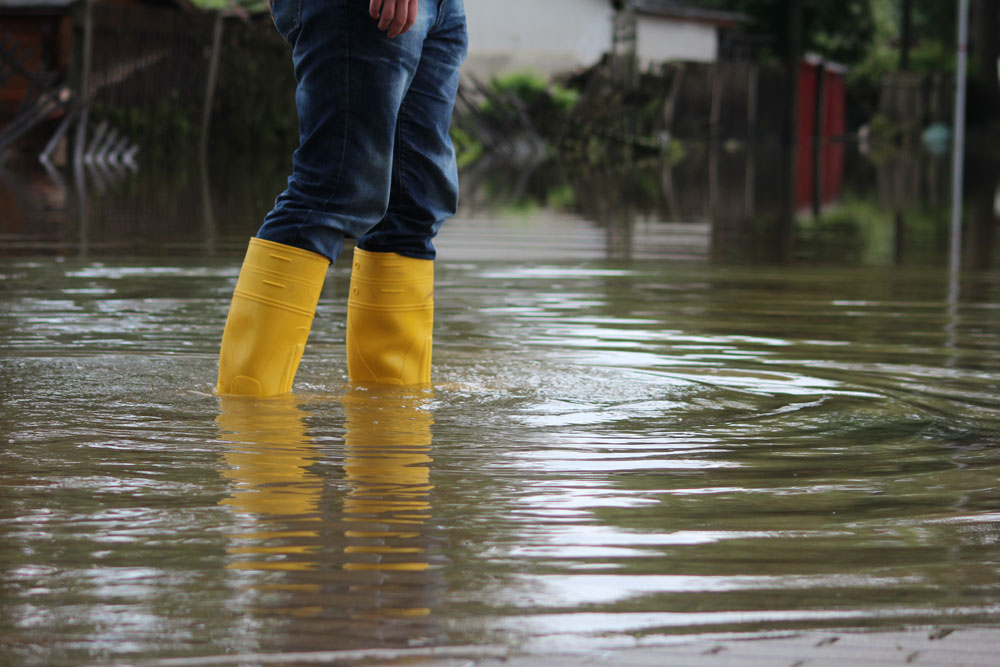Are Landlords Responsible For Flood Damage?
 CONTENTS
CONTENTS
- What is flood damage?
- Who is responsible for flood damage?
- What should you do when your home floods?
- What to do after your rental property floods
- How to minimise flood damage in a property
- Get in touch
Flooding in your home can understandably be a very distressing experience. But for people renting out properties, it is made all the more difficult by trying to figure out who is responsible for cleaning up your home.
At ICE Cleaning, we provide comprehensive flood restoration services. Our technicians can quickly restore your property to its previous condition, no matter where it is in the UK. They can be on site in a matter of hours in an emergency.
Continue reading to find out what you should do if your rental property gets flooded, and when the landlord is responsible for the flood damage.
What is flood damage?
Flood damage is the damage caused to a property by flooding. Floodwater can have devastating consequences for your property, such as:
- Compromising your foundation and leading to structural problems
- Impacting your walls, ceilings, and flooring, like drywall swelling and breaking
- Destroying appliances and impairing electrical systems
- Causing mould and mildew to grow which puts residents at risk of health problems
- Contaminating your water supply and affecting your plumbing system
It is also very dangerous to be exposed to as it can contain lots of pathogens which could harm your health. Only professionals should tackle flood damage restoration as they have the specialist products and equipment to safely get rid of all the dirt, debris, and pathogens, and restore the damage.
Who is responsible for flood damage?
It depends on what caused the flood. If it was caused by flooding from rain or a problem with a neighbouring property, the landlord is responsible for covering the cost of repairs. Should the tenant have caused the flooding themselves, like leaving a tap running, they are responsible.
The landlord is also responsible for fixing damage to the structure of the property and ensuring the water, gas, electricity, sanitation, and heating are working properly. They must pay for the flood clean up services to restore the property to its original condition, too.
What the landlord is not responsible for is replacing a tenant’s damaged belongings. This should be covered by the tenant’s contents insurance.
What should you do when your home floods?
First, activate your flood defences if you have any. Then, switch off the gas and electricity unless they have been compromised by the floodwater.
Move your valuable items to a safe place so they don’t get damaged. Make sure you move soft furnishings out of the way of floodwater, as well, as once these get soaking wet it is unlikely that they can be restored.
If you have evacuated your property, you should only return when its safe to do so and the emergency services have given you permission. Don’t drive or wade through floodwater as your car could float, or there may be hidden currents and obstacles in it. You can find out more in this blog.
What to do after your rental property floods
You must inform your landlord that the property has flooded and requires repairs as soon as possible. They will then agree with you a period of time that these repairs will be carried out.
If you can safely use the property while repairs are being carried out, you can stay there. You might be able to get a rent reduction if you can’t use all the rooms.
For serious flood damage which makes the property dangerous, you may have to move out temporarily to alternative accommodation. The landlord might have insurance that covers the cost of this and they could suspend rent payments on the home you just moved out of.
You may need to go to court if your landlord refuses to waive or reduce rent, or help with rent for temporary accommodation. It is recommended you document the state of the property, such as taking photos and videos of the flood damage, just in case you require evidence to back your claims.
This is just an overview of the guidance for tenants. You can find helpful advice for your specific situation here.
How to minimise flood damage in a property
Although preventing a flood is not always possible, there are some things tenants should do to reduce the damage it can cause:
- Shut off the main valve to stop the flooding
- Identify the early signs of a leak or flood
- Line the doors with towels and cloths to stop water escaping the affected room
- Use buckets to collect water dripping from the ceiling to protect the floor
Get in touch
Our technicians can clean up all types of floods, from coastal floods to those caused by faulty pipes. We can also provide a range of other professional cleaning services you may require, like mould remediation and drying solutions.
To find out more about our flood damage cleaning services and the restoration process, contact our team today on 0208 066 0360 or enquiries@icecleaning.co.uk. You can find out more about what to do when your rental property floods here.

Speak with me today,
I’m here to help
By asking you a few questions either via phone or email I can immediately provide a realistic estimation of the cost.
You’re in good company. We’ve cleaned for the following commercial clients… View all

Why choose us?
- Cater to a wide variety of cleaning situations
- Nationwide coverage, available 24/7
- Cater to commercial and domestic clients
- Free survey provided prior to quotation
- Emergency response team
- Offer a bespoke service designed to suit all your needs
- All technicians hold professional health and safety qualifications, including BICSc, IOSH, Dewpoint Professional & Safe Contractor
We’re fully accredited
We place best practise, professional expertise and health and safety at the core of our business. We’re fully compliant with all legal obligations. You can view a list of our accreditations below, or visit our Health & Safety page for more information.











-RGB-small.1707319151.jpg)




















